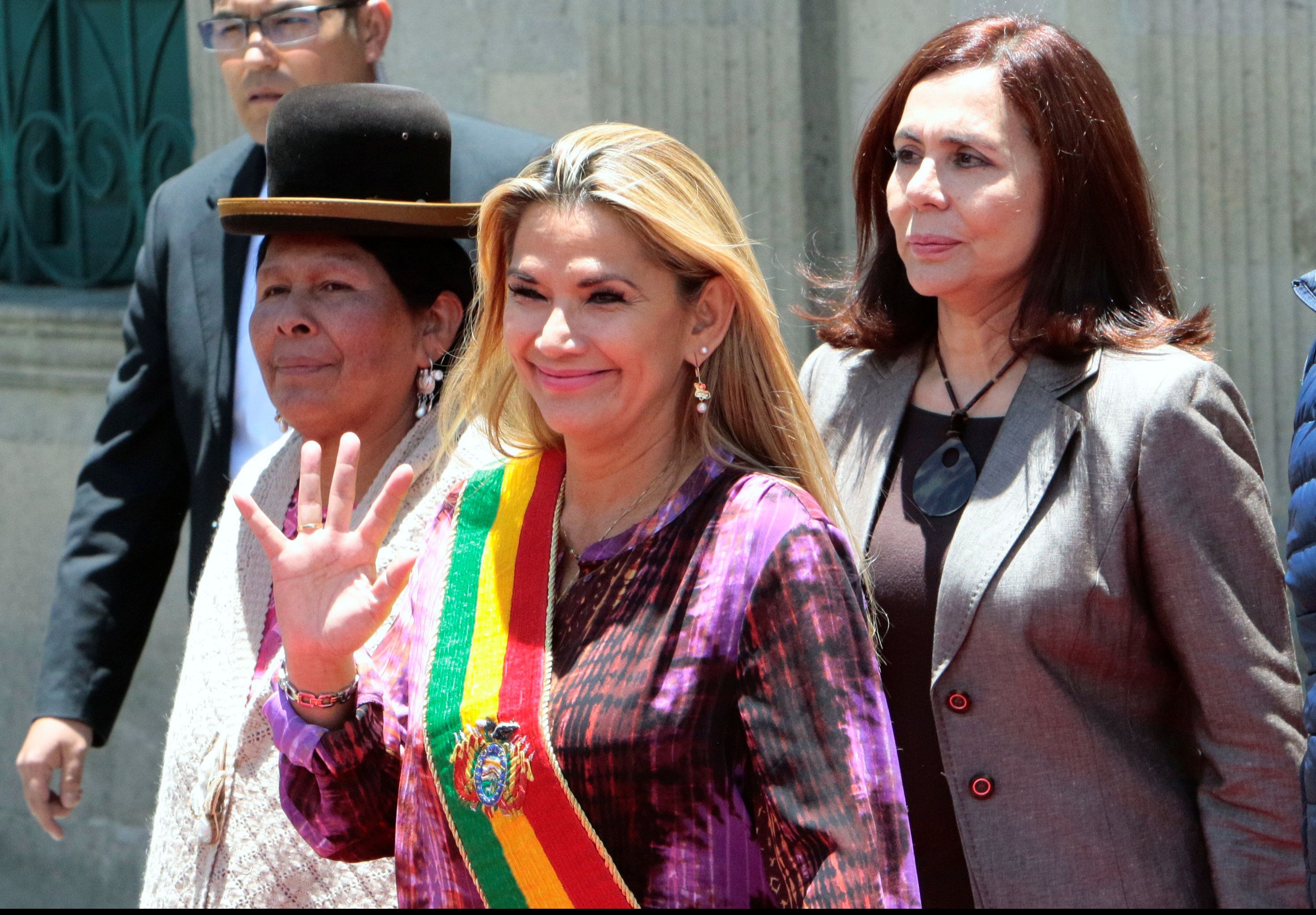November 19, 2019
Bolivia's polarizing interim president: After Bolivian president Evo Morales and his deputies were pushed out of office for rigging last month's presidential election, little-known opposition Senator Jeanine Añez took office as interim leader. Añez has promised to guide the country toward a "national consensus" ahead of new elections in January, but she's already risked deepening political divides. On day one, she lugged a giant bible into office, in a perceived swipe at Morales, who had elevated popular indigenous traditions that the ultra-conservative Ms. Añez once called "satanic." She's also abruptly reoriented the country's foreign ties toward Latin America's conservative governments. On her watch, at least eight pro-Morales protesters have been killed by the authorities. Morales himself, exiled in Mexico, says he's the victim of a coup and wants to run in the elections. Añez says he's barred, but his MAS political party still controls both houses of congress and has to be a partner for any smooth transition. Some compromise is necessary, but things don't seem to be going that way.
Impeachment and 2020 Democratic primaries: As the Trump impeachment process grinds on, a potential problem is emerging for some Democratic presidential candidates. If the House impeaches President Trump, there will be a trial in the Senate. If that trial is held in January/February, it will force Democratic senators to be in Washington rather than on the campaign trail engaging voters directly. That's potential bad news for presidential-hopeful Senators Elizabeth Warren, Bernie Sanders, Kamala Harris, Amy Klobuchar, and Cory Booker—and might be good news for rival candidates Joe Biden and Pete Buttigieg, who won't be chained to Washington. But do Republicans really want to help Biden beat Warren and Sanders, both of whom might be easier for Trump to beat? We'll be watching to see how Democrats in the House and Senate try to manage this problem.
US walks out on South Korea: Talks on the cost of basing US troops in South Korea ended abruptly Tuesday when the Americans walked out of the meeting, accusing Seoul of falling short of "fair and equitable burden sharing." Washington had demanded a five-fold yearly increase (to $5 billion) in Seoul's contribution to maintaining 28,500 American troops on the Korean peninsula. Earlier this year, Seoul agreed to pay $890 million, more than 40 percent of the day-to-day expenses of keeping US troops in the area. It also paid more than 90 percent of the hefty cost of relocating the US' main Korean base, and buys billions of dollars worth of US arms. Until now, US presidents have seen Washington's security commitments to Seoul — which date back to the 1950s when the Korean War ended without a peace treaty — as mutually beneficial: South Korea gets protection from the North, while the US gets to safeguard its security and economic interests in East Asia. Will President Trump's hardline approach to South Korea work? And will it set an enduring precedent? We're watching because similar talks on cost-sharing with Japan, Germany, and NATO are slated for next year.
What We're Ignoring
Dog days in Turkmenistan: Gurbanguly Berdymukhamedov, the eccentric autocrat who runs the gas-rich Central Asian nation of Turkmenistan, has long adored his country's renowned horse breeds (even when he's falling off of them.) But now he is pivoting to a different point on the mammalian map: dog. In particular, the Alabai, a hardy little sheepdog that has been part of Turkmenistan's traditionally nomadic society for thousands of years. Recently, he's been writing books and poems about the dogs, and now he plans to build a 50-foot tall statue of one in the capital as a symbol of national unity. We are ignoring this because we're spoiled by the last Turkmen president's penchant for building 25-story gold plated statues of himself that rotated to face the sun. Next to that, this pup stuff doesn't stack up.
More For You
Bad Bunny during the Super Bowl LX halftime show press conference at Moscone Center.
Kirby Lee-Imagn Images
100 million: The number of people expected to watch the Super Bowl halftime performance with Bad Bunny, the Puerto Rican superstar and newly minted Album of the Year winner at the Grammys.
Most Popular
Think you know what's going on around the world? Here's your chance to prove it.
- YouTube
An imminent US airstrike on iran is not only possible, it's probable.
Americans are moving less — and renting more. Cooling migration and rising vacancy rates, especially across the Sunbelt, have flattened rent growth and given renters new leverage. For many lower-income households, that relief is beginning to show up in discretionary spending. Explore what's changing in US housing by subscribing to Bank of America Institute.
© 2025 GZERO Media. All Rights Reserved | A Eurasia Group media company.
